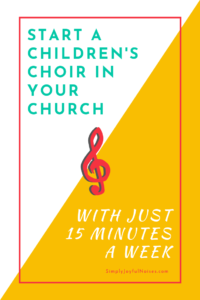Follow These Steps To Start A Simple Children's Choir In Your Church With Just 15 Minutes A Week.

This post contains affiliate links for your convenience. This means that if you make a purchase using our link, we’ll receive compensation at no additional cost to you.
Step 1) Pray
Cover this new ministry in your church in prayer from the get-go. The prayers of the righteous are powerful and effective.
Step 2) Get Permission
Every church structure and culture is a bit different, but you need to get permission from the right people in your church to start this.
Don’t go rogue and start gathering children and singing with them. You also need to make sure you go through the proper “chain-of-command” (my husband is in the Navy, thus the military speak has rubbed off a bit).
In my church, the way these conversations was that I first approached the children’s ministry coordinator and bounced the idea off of her. Once she got on board, I sent an email to our pastor giving some of the details and asking for a time to talk. I also let him know that the children’s ministry coordinator was already fully on-board with the idea of having a small children’s choir program. I offered to discuss it in person with just him or with our church’s Session. But I didn’t have to go that far. He just said, “Sounds great. Go for it! Thanks for taking the initiative on this!”
You might also bring in the worship music leader, saying the pastor is already on board, but I wanted to bring you in the loop on what is getting started with the children. I would have also made it pretty clear that he didn’t have to do anything! This is not going to add work to his busy schedule.
In a nutshell, you need to get permission or you will likely stall out before this effort even really gets off the ground
Step 3: Identify Someone (Or Two) To Lead It
If you are reading this, there is a good chance that you are the one that feels called to start this music ministry. But not necessarily. Sometimes a church leader knows that a children’s choir needs to be established, but knows someone else needs to execute. But whoever it is, someone needs to be in charge.
Who is that person for you congregation? Read more about how to select a children’s choir leader from your congregation if you aren’t the one who will lead it but know that you want your church to have a small program like this.
Step 4: Choose A Time And A Location
My recommendation is that this choir program should take place for 15 minutes a week within the existing church calendar and the existing spaces used for children’s ministry.
That might look a little different for every church, but it will likely be when some sort of children’s Bible teaching is already going on. Ideally it would be when the most children are already in attendance.
For my church, we have Sunday School from 11:00-12:00 on Sunday mornings after our worship service. The solution we came up with was to have the choir basically be the first 15 minutes of that Sunday School hour. All the children’s classes are in one room with me from 11:00-11:15, and then they break up into their Sunday School classes for their age group. I utilize the largest room my church has for the children’s classes. We have to bring chairs in from the other rooms, but the big kids are happy to help with that.
Step 5: Determine Which Children Will Be In Your Choir
If I had things my way, I’d have my children’s choir be for ages Kinder-5th grade. For reasons that are not important to you, the choir in my church is Prek-3rd grade.
There is natural inertia to all decisions we make, so know that it will be difficult (though not impossible) to change once your choir becomes established, so really think on this. I had hopes that my choir would “age” as the 3rd graders grew up and might decide to continue to come in 4th and 5th grade. With a couple of exceptions, that really has not happened. The older kids are not wanting to be around the 4 year olds (part of me can’t really blame them).
Step 6: Determine How You Are Going To Make Music/Accompaniment
There are many ways to make music. What way are you going to make music as you lead and teach?
- Keyboard (or real piano if you have access to one)
- Guitar
- CD Player
- Cell phone and blue tooth speaker
- Your own voice, perhaps with a pitch pipe
I have mostly used a mid-level, light weight keyboard that I am able to stash in the children’s ministry closet. I got my first keyboard by the church secretary emailing the congregation and asking if anyone had a keyboard lying around going unused (scrappiness is a virtue, my friends). After using that one for a year, an anonymous person bought a much nicer one as a contribution to the children’s choir program.
I have also streamed a couple of songs from my phone, but that isn’t my preference. You really need to make sure you have a blue tooth speaker attached because your regular phone speaker won’t be loud enough.
Step 7: Select Your First Song
You need to decide what you are going to sing, obviously!
I have written advice about picking your first song to teach your choir, but the truth is that it really doesn’t matter. Whatever you are feeling led to sing, just sing it!
I recommend working hard on one song at first, but even for your first rehearsals you will need some other songs to sing. Please do not make these kids detest choir because you only sing one song over and over and over for 2 months. If you are able to plan out a (rough) calendar the year with about 3-6 songs to learn, the you can sing through the other songs you plan to do in the near future.
If you aren’t sure about other songs that you really want them to learn, then you can do some fun warm-ups, or the young children’s classics like “Jesus Loves Me” or “Father Abraham”. You will hopefully very quickly get beyond “Father Abraham”, but if you are staring at a bunch of small children and freeze up, just start going with that and the time will pass!
Step 8: Pick A Date For Your First Formal, Public Presentation
Check with your church’s music leader to see if the date you are aiming for will work within the broader worship music calendar. I’d give him/her about 3 date to choose from that you are indifferent about.
But hear this, you must have your choir sing for the congregation. A formal performance gives the choir something to work towards.
A musician really only becomes legitimate when they display their craft to the public. That is why even small-time piano teachers who just teach a few students make the students have a recital in her home with a tray of cookies and punch afterwards.
At about 3 weeks before, the choir is scheduled to sing for the congregation, honestly assess their readiness and push it later if you need to. But just make sure you keep aiming for being ready for the public.
If for some reason your church leadership doesn’t think it would be a good idea for your choir to sing in the weekly worship service, then brainstorm a different time. Maybe at a ministry fair. Or maybe at a all-church potluck. If you feel doors are closing to letting these kids sing God’s praises in public, pray that the Lord will open the doors wide for you.
Step 9: Tell The Parents About The New Choir
Using whatever way works best in your church to disseminate information, make sure that you let the parents of your little singers know about this new ministry.
Ask them to pray for the effort. Ask for their support. Tell them the date that is selected for that first song to be sung to the congregation (and ask them to tell you if they have a conflict so you can reschedule if ½ your choir will be out-of-town).
Ask them to review these songs the children are learning. I personally ask the parents in my church to sing our choir songs in the car and to sing at bedtime.
Step 10: Hold Rehearsal Each Week
Now the crazy begins! You have to sing with a bunch of little kids for 15 minutes every week! Ahh! You will likely feel like you are a terrible choir director at first, but eventually you and the children will find a good rhythm.
As long as you pray, smile, repeat the songs over and over, and use the lyrics to teach some theology, the Lord will bless your efforts and these children will grow in their walk with the Lord.
Step 11: Present Your Praises To The Congregation
See step 8. Keep aiming for that target of these kids singing to the congregation. You are creating vibrant little worshippers! God will be glorified!
